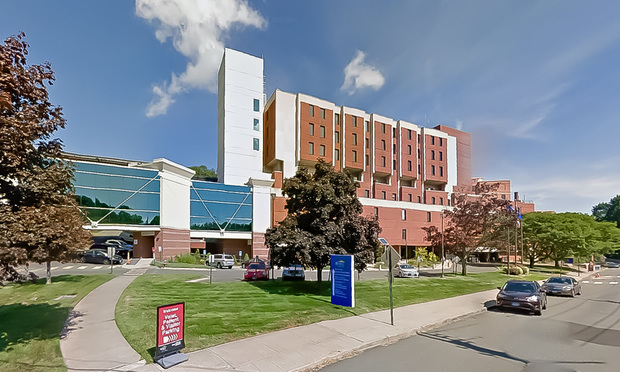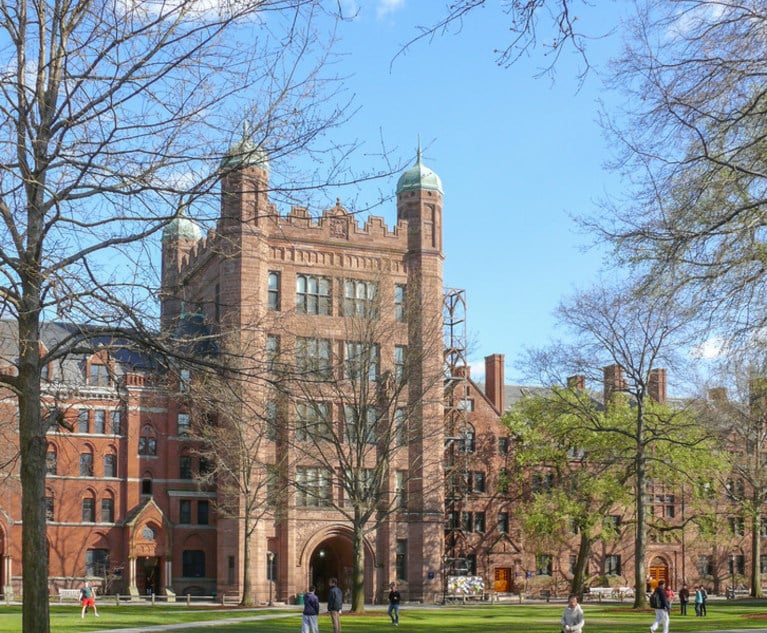Devil of a Detail: A Discrepancy Helps Hartford Lawyer Land $3.2 Million Verdict
A Superior Court jury returned a seven-figure verdict in favor of a man who sued Bristol Hospital for medical malpractice, alleging a nurse injured him while administering an enema.
January 28, 2020 at 01:45 PM
4 minute read
 Bristol Hospital. Courtesy photo
Bristol Hospital. Courtesy photo
Catching a discrepancy between defense testimony during deposition and testimony during trial helped a Hartford lawyer clinch a nearly $3.3 million jury verdict.
Plaintiffs attorney Thomas Cella said he noticed that testimony from an expert witness for the defense during deposition did not match what was offered at trial.
And it was that detail the attorney used to help sway the jury in favor of his client, whose son was once the mayor of Bristol.
The testimony, Cella said, dealt with whether a nurse could have been at fault in a medical malpractice case against Bristol Hospital.
During deposition the hospital had maintained that a nurse could have inserted an enema that perforated the patient's rectum. But Cella said he noticed that experts testifying during trial said just the opposite: It would have been nearly impossible for a nurse to have done that.
The case turned on these witnesses' trustworthiness. After a two-week trial, a New Britain Superior Court jury awarded $3.257 million to plaintiff Bruce Cockayne and his wife Marion, who filed a complaint in July 2016.
"Expert testimony often does not go as you hope it will," said Cella, a partner with Hartford-based Howard, Kohn, Sprague & Fitzgerald. "We were able to attack their testimony at trial, because it was not consistent with what they said in deposition. And drawing out those inconsistencies was critical for the jury."
The plaintiff argued a hospital nurse had accidentally perforated Bruce Cockayne's rectum in trying to insert an enema after he went to the hospital complaining of severe diarrhea. It claimed the hospital had conceded as much during discovery, allegedly acknowledging the possibility, but then later offering a different explanation.
"During trial the defense said it was impossible for the nurse to have done this," Cella said. "That was completely inconsistent to what they were saying during discovery."
Representing Bristol Hospital are Rocky Hill-based O'Brien Tanski & Young attorneys Albert Danker Jr. and Michael Rigg. Neither responded to a request for comment Tuesday.
Christopher Boyle, the hospital's director of public relations, issued a statement on the verdict.
"Bristol Hospital is disappointed by the verdict, and we expect to prevail in the appeal," Boyle wrote. "We stand by our employees, and are proud of the safe and quality care that we provide to the community."
The defense has 40 days from the date of the jury verdict to file post-verdict motions.
In court pleadings, the defense argued there was insufficient proof of a misstep by a hospital nurse, and said the plaintiff's team bore the burden of supplying that proof.
The hospital also argued that Cockayne's Crohn's disease had caused the perforation, but the plaintiff disagreed.
"Crohn's disease is known to cause, on occasion, spontaneous perforations," Cella acknowledged. "The problem, though, was that my client did not have Crohn's in his rectum."
Cella said the hospital had administered an enema on three consecutive days in February 2014 to Cockayne, 76. He said his client soon "had a massive rectal bleed" that led clinicians to discover the perforation.
Cockayne, who is the father of former Bristol mayor Ken Cockayne, had at least four surgeries due to the perforated rectum, according to information from his attorney.
"He was in a lot of pain, and suffered for about a year," Cella said.
No more surgeries are pending, the attorney said.
Cella said the Cockayne family was "ecstatic" about the jury verdict.
"They did not want to go through a trial, as Bristol Hospital was their hometown hospital," he said. "They wanted to resolve it, but it just could not be resolved."
The jury verdict includes $770,000 for loss of consortium claims on behalf of Cockayne's wife.
Read more:
Case to Proceed Against Bristol Hospital, Surgeon Accused of Sex Assault
This content has been archived. It is available through our partners, LexisNexis® and Bloomberg Law.
To view this content, please continue to their sites.
Not a Lexis Subscriber?
Subscribe Now
Not a Bloomberg Law Subscriber?
Subscribe Now
NOT FOR REPRINT
© 2025 ALM Global, LLC, All Rights Reserved. Request academic re-use from www.copyright.com. All other uses, submit a request to [email protected]. For more information visit Asset & Logo Licensing.
You Might Like
View All

Discovery Seeks to Link Yale University to Doctor in Fertility Scandal
4 minute read
SEC Puts Beat Down on Ex-Wrestling CEO Vince McMahon for Not Reporting Settlements
3 minute readLaw Firms Mentioned
Trending Stories
Who Got The Work
J. Brugh Lower of Gibbons has entered an appearance for industrial equipment supplier Devco Corporation in a pending trademark infringement lawsuit. The suit, accusing the defendant of selling knock-off Graco products, was filed Dec. 18 in New Jersey District Court by Rivkin Radler on behalf of Graco Inc. and Graco Minnesota. The case, assigned to U.S. District Judge Zahid N. Quraishi, is 3:24-cv-11294, Graco Inc. et al v. Devco Corporation.
Who Got The Work
Rebecca Maller-Stein and Kent A. Yalowitz of Arnold & Porter Kaye Scholer have entered their appearances for Hanaco Venture Capital and its executives, Lior Prosor and David Frankel, in a pending securities lawsuit. The action, filed on Dec. 24 in New York Southern District Court by Zell, Aron & Co. on behalf of Goldeneye Advisors, accuses the defendants of negligently and fraudulently managing the plaintiff's $1 million investment. The case, assigned to U.S. District Judge Vernon S. Broderick, is 1:24-cv-09918, Goldeneye Advisors, LLC v. Hanaco Venture Capital, Ltd. et al.
Who Got The Work
Attorneys from A&O Shearman has stepped in as defense counsel for Toronto-Dominion Bank and other defendants in a pending securities class action. The suit, filed Dec. 11 in New York Southern District Court by Bleichmar Fonti & Auld, accuses the defendants of concealing the bank's 'pervasive' deficiencies in regards to its compliance with the Bank Secrecy Act and the quality of its anti-money laundering controls. The case, assigned to U.S. District Judge Arun Subramanian, is 1:24-cv-09445, Gonzalez v. The Toronto-Dominion Bank et al.
Who Got The Work
Crown Castle International, a Pennsylvania company providing shared communications infrastructure, has turned to Luke D. Wolf of Gordon Rees Scully Mansukhani to fend off a pending breach-of-contract lawsuit. The court action, filed Nov. 25 in Michigan Eastern District Court by Hooper Hathaway PC on behalf of The Town Residences LLC, accuses Crown Castle of failing to transfer approximately $30,000 in utility payments from T-Mobile in breach of a roof-top lease and assignment agreement. The case, assigned to U.S. District Judge Susan K. Declercq, is 2:24-cv-13131, The Town Residences LLC v. T-Mobile US, Inc. et al.
Who Got The Work
Wilfred P. Coronato and Daniel M. Schwartz of McCarter & English have stepped in as defense counsel to Electrolux Home Products Inc. in a pending product liability lawsuit. The court action, filed Nov. 26 in New York Eastern District Court by Poulos Lopiccolo PC and Nagel Rice LLP on behalf of David Stern, alleges that the defendant's refrigerators’ drawers and shelving repeatedly break and fall apart within months after purchase. The case, assigned to U.S. District Judge Joan M. Azrack, is 2:24-cv-08204, Stern v. Electrolux Home Products, Inc.
Featured Firms
Law Offices of Gary Martin Hays & Associates, P.C.
(470) 294-1674
Law Offices of Mark E. Salomone
(857) 444-6468
Smith & Hassler
(713) 739-1250











